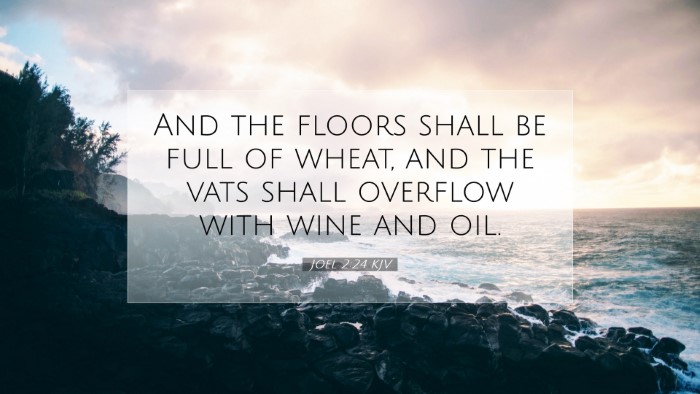Commentary on Joel 2:24
Joel 2:24 states: "And the floors shall be full of wheat, and the vats shall overflow with wine and oil." This verse, embedded in the prophetic context of Joel, speaks volumes about restoration, prosperity, and divine blessing. Here, we explore the insights drawn from several public domain commentaries to understand the depth of this promise.
Contextual Overview
In the book of Joel, the prophet describes a time of dire judgment due to locust swarms, which signify disaster and spiritual turmoil. However, Joel also introduces a theme of hope and restoration. As he transitions into chapter 2, he assures the people that after their repentance, a time of blessing will follow. Verse 24 encapsulates this promise of agricultural abundance, symbolizing a broader spiritual renewal.
Theological Insights
Albert Barnes emphasizes the significance of agricultural imagery in the ancient Near Eastern context. The promise of overflowing grain and wine conveys complete restoration of the covenantal blessings that Israel had forfeited due to disobedience. This abundance not only reflects physical well-being but also indicates spiritual richness—a vital theme throughout scripture.
Symbolism of Wheat, Wine, and Oil
The mention of wheat, wine, and oil carries deep significance:
- Wheat: The staple food that signifies sustenance and life. It represents God’s provision for both body and soul.
- Wine: Often associated with joy and celebration, wine symbolizes the joy found in God's presence and the blessings of life.
- Oil: Used for anointing and as a fuel source; it symbolizes the Holy Spirit and divine empowerment.
Matthew Henry's Perspective
Matthew Henry underscores the inversion from drought and famine to abundance. He notes that the "floors" being "full" signifies a restoration of both the material and spiritual condition of the people. The prosperity hinted at in this verse stands in stark contrast to the previous desolation caused by locusts. This shift illustrates God's merciful nature, assuring the faithful that He heals the wounds of sin and neglect.
Divine Restoration
Henry elaborates that divine restoration is not only about replenishing what was lost but about a transformative experience that revitalizes the whole community. When God pours out blessings, it invites a response of gratitude, worship, and deeper commitment. The emphasis on the overflowing vats points to abundance that cannot be contained, suggesting that God's blessings are overwhelming and surpass expectations.
Adam Clarke's Commentary
Adam Clarke approaches the verse with a pastoral lens, highlighting the emotional and spiritual implications of this agricultural renewal. He remarks that the imagery serves as a powerful reminder to the people of Israel about God’s faithfulness to His promises. Clarke notes that the mention of overwhelming abundance illustrates God's readiness to forgive and restore beyond what is deserved.
Application for Today
For pastors and scholars, the application of Joel 2:24 transcends its historical context. Clarke asserts that modern believers can take comfort in the knowledge that no matter how severe the trials they face, restoration is possible through genuine repentance and faith. This principle is vital in pastoral care, reminding congregants of the continual hope and renewal available in Christ.
Conclusion
In conclusion, Joel 2:24 presents a profound message of hope that extends across generations. The cumulative insights from Matthew Henry, Albert Barnes, and Adam Clarke reveal that this verse reassures the faithful of God's unwavering commitment to restoration and blessing. The promise of overflowing blessings—wheat, wine, and oil—characterizes a divine abundance that invokes a response of worship and rejoicing among God's people.
As we reflect on these insights, may we embrace the assurance that regardless of our circumstances, God is ever ready to restore us to a place of abundance, enriching our lives both materially and spiritually.


